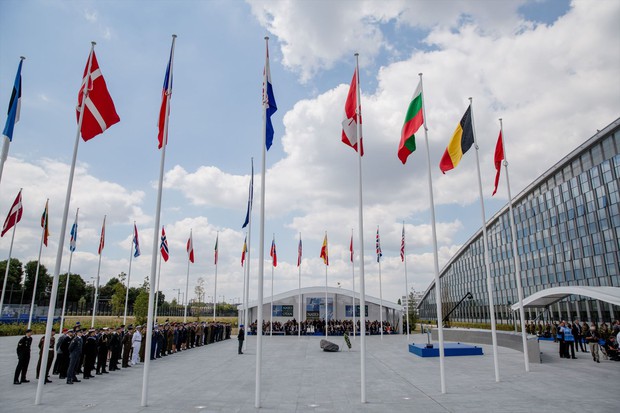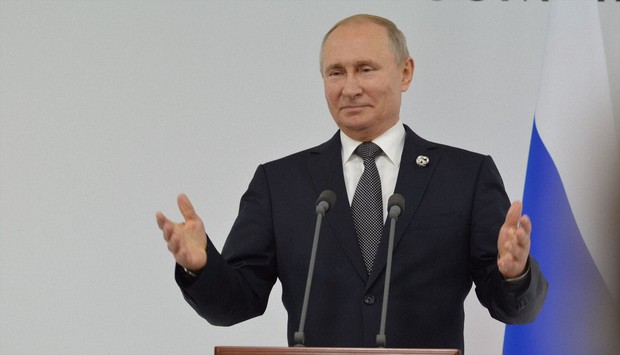What triggered the Russian invasion of Ukraine?
Part 1
Conflict between "pro-American" and "pro-Russian" in Ukraine
by Nozomu Nakaoka
Author: Nozomu Nakaoka
After graduating from International Christian University in 1971, working as an editorial board member of The Bank of Tokyo (currently Bank of Tokyo-Mitsubishi UFJ) and Toyo Keizai Inc., he is a freelance journalist. He is a Fulbright journalist from 1980 to 1981. He is a part-time lecturer at International Christian University, Japan Women's University, Musashi University, and Seikei University. He has served as a visiting researcher at Harvard University's Kennedy Graduate School of Political Science, a visiting professor at Washington University (St. Louis), a professor at Toyo Eiwa Jogakuin University, and a vice president of this university after that. His books include "American Conservative Revolution" (published by Chuokoron-Shinsha).

People evacuating Kyiv — Bloomberg
Russian invasion of Ukraine has revived the "ghost of the past" from history textbooks. It is the concepts of "the sphere of influence" and "lifeline" claimed in "geopolitics". The idea is that it is necessary to maintain a certain geographical safety zone in order to ensure the security of one's own country. The urgent issue is how to end this war. To do so, it is necessary to calmly analyze why such a situation occurred, based on the historical process. What happened and what went wrong in the relations between Russia and Ukraine, the negotiations between President Putin and the Western leaders. This time, we will deliver it twice as an extra edition of "America that Japanese people do not know".
64% of Ukrainian people support NATO membership
President Putin argues that Ukraine's accession to NATO is an "existential threat" to Russia.
On the other hand, Ukraine is heavily inclined to join NATO, contrary to Russia's will. According to a poll by local media, 64% of the people want to join (Yhiah Information Agency, April 21, 2021 "Some 64% of Ukrainians stand for Ukraine's accession to NATO-poll"). Looking at the breakdown, 43% answered "full approval" and 21% answered "approval" for NATO membership. "Absolute disapproval" is 12% and "disapproval" is 7%.
Since Russia annexed the Crimean Peninsula in 2014, the number of Ukrainian people who support NATO membership has increased rapidly. Before that, the approval for membership was around 15 to 20%. Changes in public opinion suggest that Ukrainian people have begun to feel the military threat of Russia. People who are threatened by Russia's military power are trying to escape Russia's military interference by joining NATO. More recently, President Zelenskyy signed an application for accession to EU on February 28. Ukraine's efforts to break away from Russia's influence and strengthen relations with the West will not stop.
What is Putin's goal? It is to collapse the current Ukrainian government, establish a puppet government, deny accession to NATO, and disarm under the influence of Russia. But I don't know if things will go as President Putin expects. It seems unlikely that people who have come to learn the freedom of democracy would just do what President Putin expects. The stronger the resistance of Ukrainian people, the more dire things will be caused. If the conflict prolongs, Putin's domestic base may be shaken.
However, I can say for sure that if military power is allowed to secure a "sphere of influence," the basic security framework that has supported the world after the Second World War will collapse.
After the Second World War, the only war between developed countries was the "Falklands War" between Britain and Argentina. It was also a very limited war. However, the Russian invasion of Ukraine is not a limited war, but a full-scale war. Is Putin going to militarily conquer a developed country with a population of about 42 million? Does he think he can make such a country give in to military force?
The process leading to Russian military invasion of Ukraine
Let's review the historical relationship between Ukraine and Russia.
Ukraine has a long history divided by various empires. After the Russian Revolution, it gained autonomy as the "People's Republic of Ukraine" but was annexed by the Soviet Union after World War II. With the collapse of the Soviet Union in 1991, Ukraine became independent again as a nation. However, with the independence, the conflict between pro-Western and pro-Russian factions was to be held within Ukraine. In 2014, the "Minsk Agreement" was signed, aiming for a ceasefire between the two factions, but the fighting continued even after the agreement. That is one of the backgrounds of this Russian military invasion.
President Putin called the Ukrainian leader "neo-Nazi" and repeatedly criticized the pro-Russian faction for "genocide" and claimed the legitimacy of the military invasion.
In terms of diplomatic relations, Ukraine's policy toward Russia has shaken. Upon independence, Ukraine declared neutrality and took a policy of keeping a certain distance from Russia. However, in 2013, the Yanukovych administration, a new pro-Russian faction, turned its policy toward Russia and strengthened its military and economic relations with Russia. In response, pro-Western factions launched a protest against his administration's pro-Russian policy (called the "Maidan Revolution"), the Yanukovych administration was forced to resign in 2014, and President Yanukovych went into exile in Russia. The pro-Russian faction became dissatisfied. As a result, the conflict between the pro-Western faction and the pro-Russian faction developed into a military conflict, and Russia began to intervene.
The war between Ukraine and Russia practically began in 2014. In March 2014 Russia annexed the "Republic of Crimea" on the Crimean Peninsula. Western countries have imposed economic sanctions on Russia, saying the annexation of the Republic of Crimea is a violation of international law.
In March of that year, the Donetsk Oblast parliament in eastern Ukraine decided to hold a referendum on independence, and in April the pro-Russian faction conquered the state government building and declared the establishment of the "Donetsk People's Republic." Then they asked Russia for assistance.
Furthermore, in June, in Luhansk Oblast, separatist pro-Russian armed forces occupied the building of the state government, declared the establishment of the "Republic of Luhansk", and fought a fierce military clash with the government forces.
The number of deaths from this battle reached 13,000, and the confrontation between pro-Western and pro-Russian factions reached the point of no return. To prevent fighting, 57 countries, including Ukraine, Russia, France and Germany, formed an international observer group (OSCE). As a result, large-scale fighting was avoided, but the unstable situation in the East Ukraine region continued. Russia's involvement increased as well.

Ukrainian President Volodymyr Zelenskyy — Bloomberg
In 2019, the Zelenskyy administration was launched, advocating the recapture of Crimean and accession to NATO, the eradication of corruption, and the strengthening of legal rule. The administration broke its promise to protect the rights of the minority pro-Russian faction.
Then, in 2022, when the Zelenskyy administration's policy toward Europe and the United States became clear, Russia unilaterally approved the two states claiming independence as nations and started a military invasion against Ukraine on February 24.
It can be said that Russian military invasion of Ukraine was caused by the cumulative effects of the conflict between pro-American and pro-Russian factions in Ukraine.
Putin's deep-rooted distrust regarding NATO expansion
Analyzing President Putin's speeches over the last 15 years reveals what he is thinking.
Take a look at the speech which President Putin gave at the Munich Security Conference in 2007. In this speech, President Putin warned the West that "there is a red line that must never be crossed." President Putin continued to oppose the unilateral invasion of Iraq by the United States, saying, "American military action ignores the basic principles of international law. The United States has crossed international borders. The use of military force can only be legalized if the sanctions are decided by the United Nations."
For President Putin, the "red line that must never be crossed" was Ukraine. By attacking the US invasion of Iraq, he warned against Western interference with Ukraine. Ironically, in the Russian invasion of Ukraine, Putin has been criticized for the same logic he once developed in his criticism of the United States.

President Putin once strongly criticized the US invasion of Iraq as an act that "ignores the principles of international law." — Bloomberg
In his speech President Putin continues: "I think the NATO expansion is a serious provocation that undermines mutual trust. We have the right to ask who the NATO expansion is against. What happened to the promises made by Western countries after the Warsaw Pact was abolished? Where did the promises go? " Why is NATO still expanding when the Cold War is over? He expressed a strong distrust that Russia might be the target that Western countries aim to destroy with the NATO expansion.
Next, let's take a look at his speech at the 2015 UN General Assembly. "We all know that after the Cold War, a single center of dominance has emerged in the world. Those who think they are at the top of the pyramid are strong and exceptional. They don't think it is necessary to consider the United Nations," he criticized the United States. "The consequences of America's solo military action are not the victory of democracy, but violence, poverty, and social turmoil," he slammed the consequences of the U.S. Middle East policy.
He also criticizes NATO. "The Warsaw bloc has disappeared, and the Soviet Union has collapsed. Nevertheless, NATO continues to expand as a military alliance. NATO is forcing poor Soviet nations to make the wrong choice, and that choice is whether they stand by the side of the west or that of the east." President Putin was distrustful and had a sense of crisis about NATO's eastern expansion. In 1991 the United States, Germany, France, and Britain promised Russia that NATO would not expand eastward if Russia withdrew its troops from Eastern Europe. Putin criticized that in reality they broke their promise and have been continuing to expand eastward.
President Putin has becoming more and more distrustful of the United States and NATO.
On the day of the announcement of the Russian invasion of Ukraine, President Putin said, "As a result of NATO expansion, the basic threat to Russia has been increasing," and emphasized the Ukrainian government as "a radical nationalist, Neo Nazis." "I had no choice but to launch a special military operation to protect those who have been the victims of violence by the Kyiv regime and have been murdered by them for the past eight years," he argued, emphasizing the legitimacy of the Russian invasion of Ukraine.

President Putin is distrustful of NATO — Bloomberg
President Putin has a special feeling about Ukraine. "Modern Ukraine was created by Russia, to be exact, the Bolsheviks, and Stalin annexed it to the Soviet Union. In 1954 Khrushchev took Crimea from Russia and handed it over to Ukraine." That is, Putin claims that historically Ukraine belongs to Russia.
Behind the Russian invasion of Ukraine lie President Putin's sense of crisis about NATO expansion and his historical understanding of Ukraine. Putin believes that Ukraine needs to be within the sphere of Russian influence because of his alarm about NATO. Regardless of whether Putin's claim is valid or not, there is absolutely no doubt that the United States and NATO never really tried to deal with Putin's distrust. That is the background of Russian invasion of Ukraine.
Then, what kind of attitude have the United States and NATO shown towards Russia? We will analyze it in Part 2 of this article.
Source: The original Japanese article (Weekly Economist Online)
Related article:
Part 2 of this article



